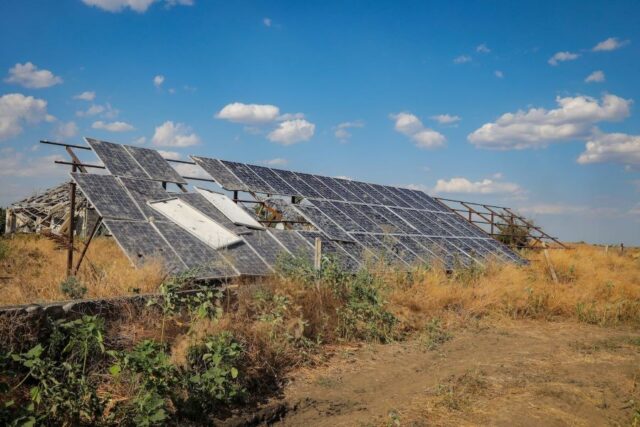
…The African Union’s admission to the G20 and the appointment of a third sub-Saharan African representative to the IMF executive board has strengthened African representation in global financial infrastructure reforms
…While advancements have been made in loss and damage mechanisms, commitments to adaptation finance and the delivery of climate finance commitments remain insufficient.
…African heads of state have called for a US$120 billion replenishment of the International Development Association, but major donors and World Bank management are only considering a US$105 billion benchmark
WED OCT 23 2024-theGBJournal| The African Future Policies Hub, A Pan-African policy support hub dedicated to supporting African ambitions in the green and digital economy spaces, has released a report highlighting the key challenges and opportunities facing African nations in the global financial system and climate finance landscape.
The report, titled “Assessing Progress Towards Reforming the Global Financial Architecture: An African Perspective,” outlines the urgent need for reforms to address imbalances in the IMF quota system, increase climate finance flows to Africa, and enhance the effectiveness of multilateral development banks.
“The assessment shows little to no progress is being made on addressing the continent’s debt concerns, high cost of borrowing, and actual disbursements against financial commitments and pledges−putting into question transparency and accountability frameworks in the financing ecosystem,” ssays Maria Nkhonjera, Senior Policy Lead (Public Finance), African Future Policies Hub.
Daouda Sembene, AfriCatalyst adds; “Africa continues to benefit from international climate finance flows primarily in the form of loans, which are in many cases at market rate. This unsustainable trend needs to be promptly reversed, particularly in the case of adaptation finance. The reform of the global financial architecture must be calibrated to help Africa raise adequate and affordable flows of climate finance, notably in the form of grants and concessional loans.”
Key findings:
Enhanced African Influence: The African Union’s admission to the G20 and the appointment of a third sub-Saharan African representative to the IMF executive board has strengthened African representation in global financial infrastructure reforms.
Unresolved Quota imbalances: The IMF’s quota system remains heavily skewed in favour of developed economies, with African nations holding a disproportionately small share.
Mixed Progress on Climate Finance: While advancements have been made in loss and damage mechanisms, commitments to adaptation finance and the delivery of climate finance commitments remain insufficient.
Multilateral Development Bank Reforms: MDB’s have initiated comprehensive reforms, but implementation has been uneven.
A number of Africa’s priorities are yet to be operationalised, including the re-channeling of SDRs through the African Development Bank. Capital Efficiency and Country Engagement: Progress in enhancing capital efficiency and transforming country engagement has been limited.
IDA Replenishment: African heads of state have called for a US$120 billion replenishment of the International Development Association, but major donors and World Bank management are only considering a US$105 billion benchmark.
G20 Common Framework for Debt Treatment: The G20 Common Framework remains unreformed, with limited progress in addressing high borrowing costs and lengthy debt resolution..
UN Tax Convention: Significant progress has been made towards establishing a legally binding UN tax convention, which could help address tax avoidance and evasion.
Global Climate Tax Standards and Trade Measures: There has been progress in advancing global climate taxes, but no progress on addressing unilateral climate-related trade measures.
Transparency in Climate Finance: Concerns remain over the transparency of “new and additional” climate finance, hindering effective climate action and resource allocation.
Debt-for-Climate and Nature Swaps: The use of debt-for-climate and nature swaps holds promise but has been limited in Africa.
New Collective Quantified Goal: African negotiators have called for the NCQG to be based on a needs-driven approach to address countries’ significant financial needs for climate adaptation and mitigation.
Official Development Assistance: The UN has set a target for developed countries to allocate 0.7% of their Gross National Income to ODA, but funding levels have been declining.
The report calls for continuous political pressure on global financial leaders and targeted advocacy efforts to drive progress in the reform of the international financial system. Upcoming negotiations offer a crucial opportunity for Africa to articulate its position and advocate for a system that truly supports its transformation and development goals.
For Iskander Erzini Vernoit, Imal Initiative for Climate and Development, “reforming the global financial architecture means many things, but from an African perspective, especially responding to the UNFCCC process, it appears clear that progress remains critically insufficient until and unless we see significant new and additional international provision of grant-equivalent finance to developing countries, on the scale of the hundreds of billions required, respectively, to equitably address mitigation, adaptation, and loss and damage needs.”
“As we head to COP29 where financing decisions will be taken, it is important to also take stock of progress on the reforms that are said to help us generate the trillions of funding needed to finance climate action in developing countries. Despite positive developments, there is clearly significant work that is still needed especially reforms requested by African countries based on their realities.” Faten Aggad, African Future Policies Hub adds.
X-@theGBJournal|Facebook-the Government and Business Journal|email:gbj@govbusinessjournal.com|govandbusinessj@gmail.com









